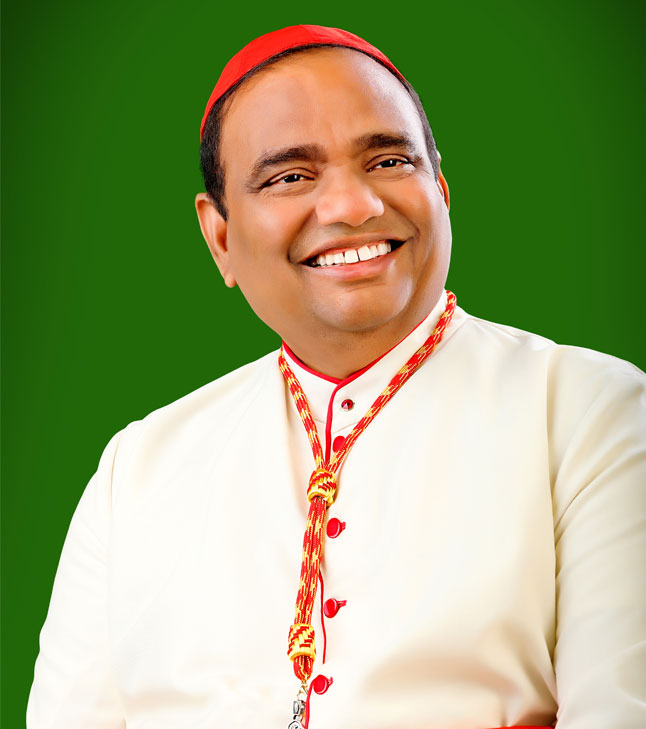
His Eminence Cardinal Poola Anthony
Archbishop of Hyderabad
Archbishop's Message
The month of November is the eschaton of the Church’s Liturgical year. The word ‘eschaton’ signifies that whenever God begins a work, He does so with a purpose and ends it productively in consummate fulfilment of His Holy purpose. The Liturgical year of Christ’s one Holy, Apostolic and Catholic Church solemnly celebrates two such beginnings every year. Firstly, She celebrates Her own birth on the Pentecost day as the new and everlasting creation, promised by God through His holy prophets and originating from the exaltation of the Son our Lord Jesus Christ at His Eternal Father’s ‘right hand’ as the Lord, Christ and high priest according to the order of Melchisedek of His new and everlasting covenant. And secondly, She celebrates the birth of Her own children ‘from above’ and through their baptismal incorporation into Christ ‘through water and the Holy Spirit’ to join Her own synodal pilgrimage of faith to the judgement seat of the Son our Lord Jesus Christ ‘to be judged by Him’ so that ‘each one will receive what he deserves, according to what he has done, good or bad, in his bodily life (2 Cor 5:10).’ In the month of November of each Liturgical Year, the Church celebrates the Eschatons of the two afore-mentioned divine beginnings. The feast of ‘All Saints’ on November 1st is the Church’s solemn celebration of God’s ‘already realized’ eschaton of all Her children ‘born from above’ in the course of Her present earthly history. And the solemnity of the Universal kingship of the Son our Lord Jesus Christ on November 23rd is the Church’s solemn celebration of God’s eschaton of Her own birth in this world as His promised new creation, which remains ‘futuristic’ until the day of the Lord’s return as the glorious Son of man.
On that day ‘all the dead in the graves will hear his voice and come out of their graves: those who have done good will rise and live, and those who have done evil will rise and be condemned (Jn.5:28-29).’ This closing event of human history constitutes the historical consummation of the covenantal kingship of the Son our Lord Jesus Christ over all mankind: ‘Then the end will come; Christ will overcome all spiritual rulers, authorities, and powers, and hand over the Kingdom to God the Father. For Christ must rule until God defeats all enemies and puts them under his feet. The last enemy to be defeated will be DEATH (1 Cor.15:24-25).’
The Church’s earthly synodal pilgrimage of faith terminates continually at the judgement seat of the Son our Lord Jesus Christ where it gets sorted into three distinct streams of human persons: (1) Those who, after having received baptism, have incurred no stain of sin whatever, and those persons who, having contracted the stain of sin after baptism have been truly penitent and die in God’s love after having been perfectly purified of all their sins by worthy fruits of penance for their sins of commission and omission before their bodily death on earth constitute the first stream. They are received immediately (mox) intoheaven and ‘clearly see and enjoy’ God Himself, namely the Blessed Trinity, the Father, the Son and the Holy Spirit in their one Eternal Godhead, ‘some more perfectly than others, according to the diversity of their merits’. This is the eschaton of the Blessed we celebrate on Nov.1st every year. (2) Those baptized human persons who have died before having satisfied by worthy fruits of penance for their sins of commission and omission constitute the second stream. They are detained in purgatory to be cleansed of all their sins through purgatorial penalties after which they are admitted into the company of the first stream, namely the community of all the Saints who see and enjoy the Blessed Trinity face to face. In purgatory they experience the afflictions of the Devil and his angels in strict proportion to their partial belonginess to them through their venial sins, in accordance with the justice of God. And on the other hand, they experience the consoling mercy of God through ‘the acts of intercession (suffragia) of the living faithful on earth, namely the sacrifices of the Mass, prayers, alms and other works of piety which the faithful are wont to do for the other faithful according to the Church’s practice’. The Church commemorates this community of Her faithful departed on Nov.2nd every liturgical year and earnestly serves God’s mercy for them on this day and during the whole month of November. (3) All those who die unrepentant ‘in actual mortal sin’ constitute the third stream. These, go down ‘immediately (mox) into hell (ininfernum)’, to justly partake of the punishments of the Devil forever in proportion to their sinful and total belongingness to them at the moment of their bodily death on earth.
The merciful Father asks everyone of His children in His Church to choose here and now to which of the three streams he or she would want to belong at the judgement of seat of Christ and prepare themselves accordingly and earnestly during their present post-baptismal synodal pilgrimage of faith, hope and charity: ‘If today you hear My voice, harden not your heart.’